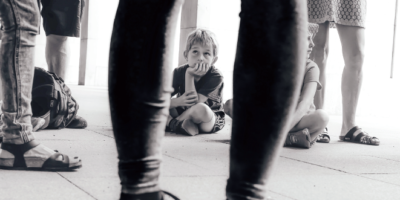
A Trans Boy and His Remarkable Parents
What We Will Become: A Mother, A Son, and A Journey of Transformation
(Houghton Mifflin Harcourt, $27) tells two riveting stories of transformation, in alternating chapters of sublime prose. The first is that of the author, Mimi LeMay. Raised in an Orthodox Jewish home in Israel and the U.S., she studied for years at Gateshead Seminary, the prestigious girls’ yeshiva in England, attended college in Boston and ultimately leaves behind her religious tradition, which she found stultifying, and demeaning to women. Though we may have read narratives of this sort before, the complicated details of Lemay’s own mystery-filled childhood feel very fresh.
The second story is the journey Mimi takes with Em, the pseudonym Lemay uses when referring to her child as female. Em was born a girl, but identifies strongly as a boy from the age of two. We join the loving and hyper-alert Mimi, her husband and her two other young daughters on the difficult journey they travel to help Em become Jacob a few months before his fifth birthday.
We understand that Mimi’s ability to see her child’s pain clearly and embrace the necessity for him to be himself, despite some social opprobrium, comes from her own journey away from Orthodoxy’s religious and social constraints. “Jacob my love, it is you that have transitioned us to a life less ordinary and so much more meaningful than it ever would have been. Thank you deeply for your sacred trust.” Mimi’s intent in making public this letter she wrote to her five-year-old son (and her expansion of it into this book) is to “provide comfort and strength to another mother or father with an aching heart. To provide this message. It doesn’t get better. It gets awesome.”
But do not imagine that this is a sickly-sweet portrait where everything goes smoothly. We are allowed to witness the internal confusion and despair that Mimi experiences in both of the transition stories she tells.
For Mimi, in her religious life, it is her mother, an Orthodox woman, who feels betrayed by her daughter’s choices. Their relationship, with some unexpected twists and turns shapes Mimi’s own responses as a mother. But I was most taken by Mimi’s words about her mother in the prologue:
“I am grateful for my mother, Judith. Ours is a complex love built on a complicated past, but I have no doubt that every choice she has made for her children has been true to her strong
moral compass and deep, abiding faith… I admire her. I remain wounded by her. She is a mystery I may never solve.” This description deserves its own book.
We also meet the naysayers who disagree with Mimi’s decisions about her child. Em’s loving older sister, Ella, worries about the kids who are not nice to Em, because Em is different and gender non-conforming. There is the child at a party who says “What is THAT?” pointing to Em. As Mimi explains to her daughter and to anyone who will listen, “What you are in your heart and your mind is far more important that what you are in your body.”
Early on in the journey, Mimi learns about the extremely high rate of suicide and attempted suicide in transgender youth; a recent study found that 51% of female-to-male transgender
adolescents report having attempted suicide. This fact is always with Mimi as she navigates a largely unmapped path, along with the indicators that a child’s gender transitioning is not some mere whim; the clue is that the expression of desire to be a different gender from that assigned at birth must be “insistent, persistent, and consistent.”
And then there are moments when the path is illuminated. On a family trip to Disney World, Jacob’s sisters dress as princesses, while he dresses as Prince Charming. All the Disney characters in the park see and accept him as a boy. He is elated, and for once seems comfortable in his own skin. When he is treated as a boy, his anger, his sadness, his twitchy gestures fade away. This trip, where nobody knows their child as a girl, reinforces for Mimi and her husband that the time has come to offer Em the choice to transition socially. Em becomes Jacob, starts to present as a boy outside his home, and switches to a new, supportive school. Not every child is so fortunate.
This book could not come at a more crucial time. In January 2020, the South Dakota House passed a bill that would fine or imprison pediatricians who offer gender-affirming care for trans children under the age of 16. Since then, conservative legislators in Florida, Colorado, Missouri, Oklahoma, South Carolina and Kentucky have followed suit. Gender-affirming care, which is endorsed by the American Academy of Child and Adolescent Psychiatry and the American Academy of Pediatrics, supports children and their families in social transitioning (changing names, style of dress and pronouns) and offering puberty blocker medications at puberty. These medications are a reversible intervention, one that allows teens more time to confirm their identity and not experience the anguish resulting from developing secondary sex characteristics which feel alien to them. It appears the politicians in South Dakota haven’t yet read the medical literature, which shows that these interventions save lives. Children who are affirmed are much less likely to be depressed or attempt suicide. South Dakota is ground zero for this culture war, as it was the first state to pass legislation restricting transgender students’ bathroom rights. Fortunately, that bill was vetoed by the governor, but became the model for several other states where it became law.
I predict that What We Will Become will become a classic, one of those books that changes the way we, as a society, view the transgender experience, particularly the lived experience of
very young children and their families.
Nechama Liss-Levinson, PhD., is a psychologist in private practice and the author of several articles and children’s books about developmental milestones in the Jewish family, including
When a Grandparent Dies and When the Hurricane Came. This review is dedicated to the memory of Jayme Schlenker.





